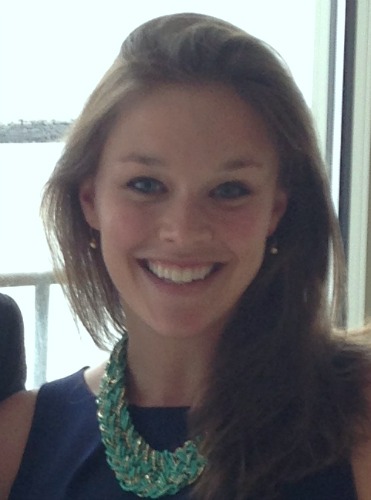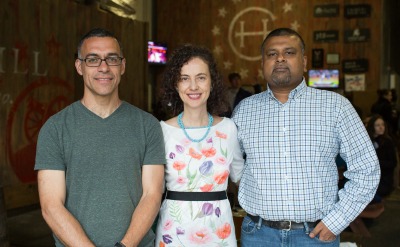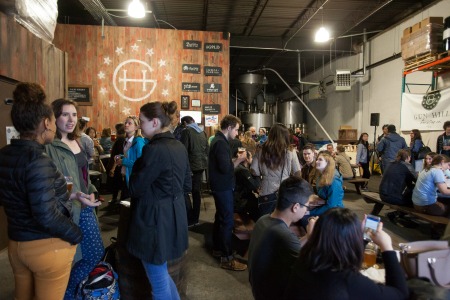Editors’ Note: Pint of Science is a three-day global festival that seeks to stoke interest in science in “everyday people.” On May 18, one event took place at Gun Hill Brewery in the Bronx. Albert Einstein College of Medicine student Julie Nadel, a Ph.D. candidate in the department of genetics in Dr. John Greally’s lab, organized the event and served as the evening’s host. Speakers included Einstein’s Dr. Kartik Chandran, a noted expert on Ebola, Dr. Ina Vandebroek, an ethnobotanist at the New York Botanical Garden, and Dr. Patricio I. Meneses, an associate professor of biological sciences at Fordham University. We asked Julie about the importance of communicating about science to the general public.

Julie Nadel
How did you get involved with Pint of Science?
Jeanne Garbarino, Ph.D, who co-hosted the event with me, is in charge of the outreach program at Rockefeller University. She was a co-organizer of the programming for Pint of Science throughout New York City. When she gave a talk, “Incorporating Communication and Outreach into Your Scientific Brand,” at Einstein in March, I was able to attend a Career and Professional Development Program student dinner with her afterward, and I expressed my interest in participating in the program.
I am passionate about science outreach and communication, and also enjoy beer occasionally, so this seemed like the perfect event for me to help organize! I knew there would be strong interest among students and faculty at Einstein, but wanted to extend the potential audience to the rest of the Bronx, so I tried to do that by inviting speakers from other local science institutions, hoping they could gather a following.
How can Pint of Science be a springboard for a larger movement to share science among scientists and create interest in science among nonscientists?
I think Pint of Science is actually a consequence of this movement rather than a springboard. In New York City, there are already many “drinking and science” events, run by institutions such as the American Museum of Natural History (SciCafe), the BioBus/BioBase outreach program (Free Drinks, Fast Science) and the Secret Science Club.
Although the goal of many of these programs is to increase the exposure of nonscientists to scientific concepts, most people who attend them already have at least a casual interest in science. I think a more important result of the events is actually the exposure of nonscientists to the scientists themselves, rather than to the scientific content.
If you Google “Science is . . .” and let Google autofill your question, the options to select include “real,” “fun” and “awesome.” However, if you try the same with “Scientists are . . . ,” your options to complete the sentence include “stupid,” “arrogant” and “wrong.” I don’t think the general public has a problem with interest in science. Science tends to be exciting. However, the way most people feel about scientists is completely disconnected from their feelings about the field scientists dedicate their lives to, and it isn’t entirely the fault of the media or the public.
Scientists tend to put themselves in an ivory tower. We often have a hard time communicating scientific concepts in a way nonscientists can grasp, and many scientists don’t even try. Programs such as Pint of Science can show that we are normal people (for the most part) who also like to have beer, and can casually discuss our life’s passion over pints. And I think that can be much more important for the progress of science than an audience member learning a fun fact about a particular subject.

L-R: Drs. Patricio I. Meneses, Ina Vandebroek and Kartik Chandran
For this event, rather than choosing the topics I wanted to see presented, I chose scientists I was confident were good communicators. Their areas of study also happened to fit a general audience’s interest: the well-known viruses Ebola and HPV, and ethnobotany focusing on the Bronx population. I think it would be much harder to draw a crowd to hear about something such as a knockout gene in Drosophila that alters wing-hair growth—not that it isn’t interesting, but for most people outside the field, it’s not something they can relate to. Unfortunately, those of us who do basic research rather than studying a disease model have to clear a more difficult hurdle in gaining public interest, but this problem may diminish over time if events such as this continue to gain attention from a nonscientist audience.
How do you see events such as Pint of Science affecting the way the general public perceives science and scientific endeavors?
I hope events such as Pint of Science can help bridge the gap between scientists and their communities. Scientists make valuable contributions to public health and knowledge, and yet are often vilified because their intentions are misperceived. There is a growing mistrust of science in the U.S. on the part of the general public and the media (with issues such as climate change and evolution being typically Republican, and vaccines and GMOs more typically Democratic). I hope events such as this can put more people on the side of scientists, so they can see that scientists are real people who care about the well-being of society and work hard to contribute positively to it.
This took place at a brewery. Where else would you like to see science presented?
 Everywhere. I think science should be incorporated into daily life as much as possible—the two should be inseparable. My email signature includes a quote from Rosalind Franklin: “Science and everyday life cannot and should not be separated.”
Everywhere. I think science should be incorporated into daily life as much as possible—the two should be inseparable. My email signature includes a quote from Rosalind Franklin: “Science and everyday life cannot and should not be separated.”
Science can be seen in everything around us and in the way we interpret the world. It would be great if it were more widely accepted and embraced more vigorously.

